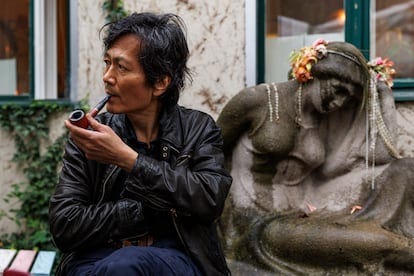“There is a sublime coherence at the heart of beauty … There is a profound balancing within beauty.”
- John O’Donohue
Contemporary society is experiencing an exhaustion of the spirit. Our common sense of inner life, of a vibrant interiority, feels that it is becoming brittle. We are, to put it mildly, acting very tired.
Perhaps this is a terribly unquantifiable thing to claim, but humor me, please, and ask yourself—is our common life becoming deeper or more shallow? More attentive to the contemplative, or to the loud? More ready to forgive, or to condemn? More ready to listen, or to argue? To build or to destroy? Do the people in your life—let alone you—seem more grounded than they did ten years ago? Twenty? All of these things are visible evidences of an interior life, and all of them, from public evidences, seem to be in decline. Yes, that is anecdotal. Yes, it is also true.
The retreat of this interior life may be seen as a lack of respiration, of the “breathing” faculty of the human soul. As bodies breathe—renewing themselves by means of nourishing exchange of life with the wider world—so do cultures, nations, institutions, and individuals. Breath is another word for “spirit” of course, and a long essay could be written on this metaphor alone.
Hyperventilation is a meaningful abstract category when that respiration becomes fast, shallow, and uncontrolled. (Think perhaps of your internal state when you are reading too much news. Your resting heart rate might be quite low, but something in is racing, edging near to panic.) Hypoxia also has a spiritual equivalent, when a “breathing” thing stagnates, and becomes unable to keep its constituent parts fresh and enlivened. (This might be the state of “checking out,” the behavior of the addict or the depressive, or one who is struggling to be present to their own life.)
I am not the only person to apply this metaphor to culture. Korean-German philosopher Byung-Chul Han applies it brilliantly in his 2010 monograph The Burnout Society1. Han claims that a change occured in the 20th Century. He says the Modern West shifted from a society whose individuals were suffering from a spiritual state comparable to strangulation, into one whose individuals were drowning. Both states, of course, result in death from a lack of breathing. But metaphorically, this identical result is due to opposite causes: too little in the first case, and too much in the second.
He points to the work of Sigmund Freud, whose psychological insights arose largely in response to repression experienced by his patients. Through the strictures of legalistic religion or social negativity (say, regarding sex or other profound pleasures), neuroses and disorders arose as the mind worked to adapt to conditions that were unnatural or unwelcome to it. For Han though, this age is gone. Instead, the “signature affliction” of contemporay life is an “excess of positivity.” There is too much “Yes” in the world.
While we might usually think of negativity as a source of harm, Han says that positivity has equal and opposite destructive capability, a “violence of positivity.” This violence, oddly, comes from the destruction of boundaries, in which we lose where we end and the rest of the world begins. Without limitations, we become unable to truly experience the sharp difference of the Other and soon “drown” in a flood of the Same. The result becomes not a dangerous stricture (as in Freud’s day), but a dangerous swamp. This situation is all the more deadly because it does not “presume or require hostility.” It does not trigger our natural instincts for self-preservation or defense. It can appear as safe or even therapeutic, while functioning as a “new form of violence.”
While we think of negativity as a source of harm, Han says that positivity has equal and opposite destructive capability, a “violence of positivity.”
Han sees this principle scale dramatically, from the culture-level explosion of incomprehensibly vast amounts of information, to the personal experience of “burnout,” which he attributes to individual habits of self-exploitation. We are no longer in Freud’s “disciplinary society,” but have instead raised up an “achievement society” in its place. I Should has been replaced by I Can. The former produced “madmen and criminals.” The latter is producing “depressives and losers.” (Ouch, man.)
Han:
The new human type, standing exposed to excessive positivity without any defense, lacks all sovereignty. The depressive human is an animal laborans that exploits itself—and it does so voluntarily, without any external constraints. It is predator and prey at once.
We feel that we are in charge, but in fact are losing the capacity for choice. We feel that we are doing what we want, but we have forgotten what want really is. We feel that we are connected to others, but experience a profound loneliness. We cannot catch our breath, and the waves keep coming. All of this, because we are losing the goodness of the No.
Keep reading with a 7-day free trial
Subscribe to THE ROSE FIRE to keep reading this post and get 7 days of free access to the full post archives.





